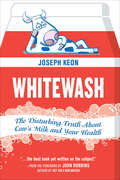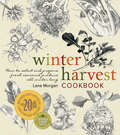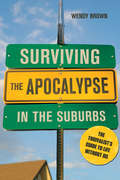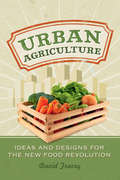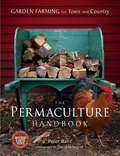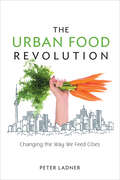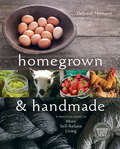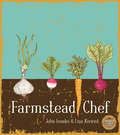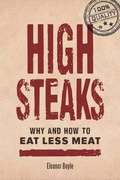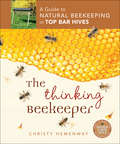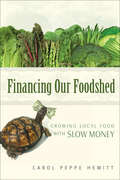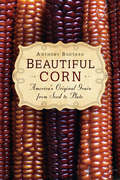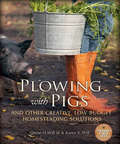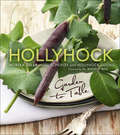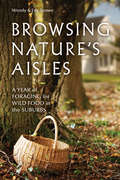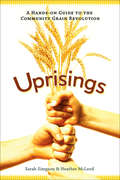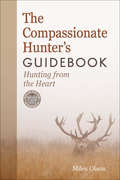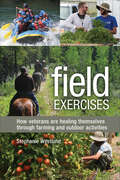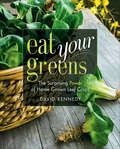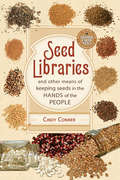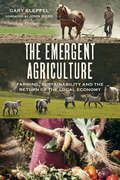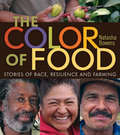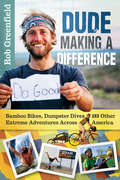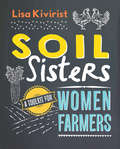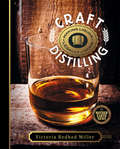- Table View
- List View
Whitewash: The Disturbing Truth About Cow's Milk and Your Health
by Joseph KeonNorth Americans are some of the least healthy people on Earth. Despite advanced medical care and one of the highest standards of living in the world, one in three Americans will be diagnosed with cancer in their lifetime, and 50 percent of US children are overweight. This crisis in personal health is largely the result of chronically poor dietary and lifestyle choices. In Whitewash, nutritionist Joseph Keon unveils how North Americans unwittingly sabotage their health every day by drinking milk, and he shows that our obsession with calcium is unwarranted. Citing scientific literature, Whitewash builds an unassailable case that not only is milk unnecessary for human health, its inclusion in the diet may increase the risk of serious diseases including: Prostate, breast, and ovarian cancers Osteoporosis Diabetes Vascular disease Crohn's disease Many of America's dairy herds contain sick and immunocompromised animals whose tainted milk regularly makes it to market. Cow's milk is also a sink for environmental contaminants and has been found to contain traces of pesticides, dioxins, PCBs, rocket fuel, and even radioactive isotopes. Whitewash offers a completely fresh, candid, and comprehensively documented look behind dairy's deceptively green pastures and gives readers a hopeful picture of life after milk. Joseph Keon has been a wellness consultant and nutrition and fitness expert for over twenty-five years. He is considered a leading authority on public health and has written three books, including Whole Health: The Guide to Wellness of Body and Mind and The Truth About Breast Cancer.
Winter Harvest Cookbook: How to Select and Prepare Fresh Seasonal Produce All Winter Long (Mother Earth News Books for Wiser Living)
by Lane MorganAnyone can include more local food in their diet at the peak of summer, but what do you do when the tomatoes are done and the first greens of spring are months away? The Winter Harvest Cookbook takes a seasonal approach to eating, even during the coldest months of the year. This fully updated and revised twentieth anniversary edition includes more than two hundred simple, mouth-watering recipes showcasing fresh produce from the winter garden or local market, rounded out by introductions to unfamiliar ingredients, shopping tips, menu suggestions, and resource lists. The author also invites us into her corner of the Pacific Northwest, with vignettes drawn from the region's farming, gardening, and cooking. Tantalize your tastebuds with an incredible array of soups, salads, sides, sauces, entrées, and desserts such as: Roasted brussels sprouts with sweet potatoes and garlic Penne with arugula, kale, and goat cheese Salad of roasted golden beets with feta and hazelnut oil Pot roast with hazelnut barley With a greatly expanded array of vegetarian and vegan dishes, Winter Harvest Cookbook is a must-have for anyone who wants to enjoy fresh, local, and delicious food--any time of the year!
Surviving the Apocalypse in the Suburbs
by Wendy BrownBased on the premise that we have 21 days before we lose our modern conveniences, Surviving the Apocalypse in the Suburbs is packed with practical solutions for becoming more self-reliant and transitioning to a lower energy lifestyle. From shelter to livestock to transportation to tools, this is the ultimate guide to simplifying your lifestyle while reducing your dependence on oil.
Urban Agriculture
by David TraceyUrban Agriculture is packed with ideas and designs for anyone interested in joining the new food revolution. First-time farmers and green thumbs alike will find advice on growing healthy, delicious, affordable food in urban settings. From condo balconies to community orchards, cities are coming alive with crops. Get growing!
The Permaculture Handbook
by David Holmgren Peter BaneThe urban landscape has swallowed vast swaths of prime farmland across North America. Imagine how much more self-reliant our communities would be if thirty million acres of lawns were made productive again. Permaculture is a practical way to apply ecological design principles to food, housing, and energy systems, making growing fruits, vegetables, and livestock easier and more sustainable.The Permaculture Handbook is a step-by-step, beautifully illustrated guide to creating resilient and prosperous households and neighborhoods, complemented by extensive case studies of three successful farmsteads and market gardens. This comprehensive manual casts garden farming as both an economic opportunity and a strategy for living well with less money. It shows how, by mimicking the intelligence of nature and applying appropriate technologies such as solar and environmental design, permaculture can:*Create an abundance of fresh, nourishing local produce *Reduce dependence on expensive, polluting fossil fuels*Drought-proof our cities and countryside*Convert waste into wealthPermaculture is about working with the earth and with each other to repair the damage of industrial overreach and to enrich the living world that sustains us. The Permaculture Handbook is the definitive practical North American guide to this revolutionary practice, and is a must-read for anyone concerned about creating food security, resilience, and a legacy of abundance rather than depletion.Peter Bane is a permaculture teacher and site designer who has published and edited Permaculture Activist magazine for over twenty years. He helped create Earthaven Ecovillage in North Carolina, and is now pioneering suburban farming in Bloomington, Indiana.
The Urban Food Revolution: Changing the Way We Feed Cities
by Peter LadnerOur reliance on industrial agriculture has resulted in a food supply riddled with hidden environmental, economic, and health care costs and beset by rising food prices. With only a handful of corporations responsible for the lion's share of the food on our supermarket shelves, we are incredibly vulnerable to supply chain disruption.The Urban Food Revolution provides a recipe for community food security based on leading innovations across North America. The author draws on his political and business experience to show that we have all the necessary ingredients to ensure that local, fresh sustainable food is affordable and widely available. He describes how cities are bringing food production home by:*Growing community through neighborhood gardening, cooking, and composting programs*Rebuilding local food processing, storage, and distribution systems*Investing in farmers markets and community supported agriculture*Reducing obesity through local fresh food initiatives in schools, colleges, and universities*Ending inner-city food desertsProducing food locally makes people healthier, alleviates poverty, creates jobs, and makes cities safer and more beautiful. The Urban Food Revolution is an essential resource for anyone who has lost confidence in the global industrial food system and wants practical advice on how to join the local food revolution.Peter Ladner has served two terms as a Vancouver City Councilor. With more than thirty-five years of journalistic experience, he is a frequent speaker on community issues and has a special interest in the intersection of food policy and city planning.
Homegrown and Handmade
by Deborah NiemannOur food system is dominated by industrial agriculture and has become economically and environmentally unsustainable. The incidence of diet-related diseases, including obesity, diabetes, hypertension, cancer, and heart disease, has skyrocketed to unprecedented levels. Whether you have forty acres and a mule or a condo with a balcony, you can do more than you think to safeguard your health, your money, and the planet.Homegrown and Handmade shows how making things from scratch and growing at least some of your own food can help you eliminate artificial ingredients from your diet, reduce your carbon footprint, and create a more authentic life. Whether your goal is increasing your self-reliance or becoming a full-fledged homesteader, it's packed with answers and solutions to help you:*Take control of your food supply from seed to plate*Raise small and medium livestock for fun, food, and fiber*Rediscover traditional skills to meet more of your family's needs than you ever thought possibleThis comprehensive guide to food and fiber from scratch proves that attitude and knowledge is more important than acreage. Written from the perspective of a successful self-taught modern homesteader, this well illustrated, practical, and accessible manual will appeal to anyone who dreams of a simpler life.Deborah Niemann is a homesteader, writer, and self-sufficiency expert who presents extensively on topics including soapmaking, bread baking, cheesemaking, composting, and homeschooling. She and her family raise sheep, pigs, cattle, goats, chickens, and turkeys for meat, eggs, and dairy products, while an organic garden and orchard provides fruit and vegetables.
Farmstead Chef (Mother Earth News Books for Wiser Living)
by John D. Ivanko Lisa KiviristJoin Lisa Kivirist and John Ivanko, proprietors of the award-winning Inn Serendipity, as they launch a return to our roots of independence, self-sufficiency, and frugality, blended with the spice of modern living. Farmstead Chef whips up a quirky, homespun tale of how we can eat well, nourish our bodies, and restore the planet. Rediscover the benefits of homegrown food and homemade cooking, preserving the harvest, and stocking the pantry, all while building community.From breakfasts to mouth-watering desserts, Farmstead Chef showcases the creative and budget-friendly side to eating lower on the food chain more often while taking responsibility for the food we put into our bodies-by growing it, sharing it, and savoring it. Recipes include:*Zuchini Feta Pancakes*Winter Squash Fritters*Herb-Infused Spare Ribs*Strawberry Dessert Pizza*Homemade Graham CrackersAfter your meal, pull up a chair and enjoy inviting slice-of-life "Kitchen Table" features, such as interviews with local food heroes and visionaries transforming our food system. Farmstead Chef also shares practical cooking tips and lively short essays inspired by John and Lisa's organic, self-reliant homestead and bed and breakfast. This fully illustrated cookbook will show you how to reconnect with nature through food, especially when shared with friends.Lisa Kivirist and John Ivanko are co-authors of the award-winning Ecopreneuring and Rural Renaissance. Lisa is also a distinguished Kellogg Food and Society Policy Fellow, and John is co-author and principal photographer for six multicultural children's books. John and Lisa are innkeepers of the award-winning Inn Serendipity Bed & Breakfast.
High Steaks
by Eleanor BoyleEach year the average North American ingests well over two hundred pounds of animal protein. Meanwhile the global appetite for meat has increased dramatically. But feeding our meat addiction comes at tremendous cost. Maintaining our current level of consumption is ecologically impossible in the longterm and undermines our personal health and community well-being.High Steaks documents the disastrous consequences of modern large-scale industrial meat production and excessive consumption, including:*The loss of vast tracts of arable land and fresh water to intensive livestock production*Increased pollution, loss of biodiversity, deforestation, and accelerating climate change*The environmental and health impacts of too much animal fat, and of antibiotics and other chemicals in our food.Timely and compelling, this powerful book offers a modest, commonsense approach to a serious problem, suggesting strategies for all of us to cut back on our consumption of animal products and ensure that the meat we do consume is produced in a sustainable, ecologically responsible manner. At the same time, High Steaks describes progressive food policy shifts that will discourage factory farming and encourage people to eat in ways that support ecosystems and personal health.Eleanor Boyle has been teaching and writing for twenty-five years, with a focus on food systems and their social, environmental, and health consequences. As well as working with organizations aiming for better food policy, she holds an MSc in food policy and is an instructor at the Centre for Sustainability at the University of British Columbia.
The Thinking Beekeeper: A Guide to Natural Beekeeping in Top Bar Hives (Mother Earth News Books for Wiser Living)
by Christy HemenwayA beginner&’s complete guide to keeping bees in top bar hives, and why. What&’s the buzz about the growing popularity of backyard beekeeping? Providing habitat for bees, pollinating your garden, and producing honey for your family are some of the compelling reasons for taking up this exciting hobby. But conventional beekeeping requires a significant investment and has a steep learning curve. The alternative? Consider beekeeping outside the box.The Thinking Beekeeper is the definitive do-it-yourself guide to natural beekeeping in top bar hives. Based on the concept of understanding and working with bees&’ natural systems as opposed to trying to subvert them, the advantages of this approach include:· Simplicity, sustainability, and cost-effectiveness · Increased safety due to less heavy lifting and hive manipulation · Chemical-free colonies and healthy hives Top bar hives can be located anywhere bees have access to forage, and they make ideal urban hives. Emphasizing the intimate connection between our food systems, bees, and the well-being of the planet, The Thinking Beekeeper will appeal to the new breed of beekeeper who is less focused on maximizing honey yield, and more on ensuring the viability of the bee population now and in the coming years.Mother Earth News Books for Wiser Living Recommendation&“You&’ll find information you need here that&’s not available anywhere else. Both you and your bees will benefit from Christy&’s approach, advice, and philosophy.&” —Kim Flottum, editor, Bee Culture Magazine&“A unique and exceptional resource for the beginning beekeeper.&” —Marty Hardison, top bar beekeeper, educator and international developmental beekeeping consultant
Financing Our Foodshed: Growing Local Food with Slow Money
by Carol Peppe HewittIn towns and cities across North America, a quiet revolution is underway. Fed up with sending their money off to make a fast buck in faraway markets, people are putting their money to work where they live, in markets they trust and understand--starting with food. Financing Our Foodshed is a collection of real life stories of these Slow Money pioneers and the local food entrepreneurs, sustainable farmers, bakers, restaurateurs, and more that they have chosen to support. Fueled by their desire to do more than just eat local food, lenders of "nurture capital" are making low-interest, peer-to-peer loans to the people who produce, process, distribute, and sell food. Meet passionate entrepreneurs including: Abi, a talented artist-turned-baker, who borrowed the funds for a commercial oven to start a gluten-free bakery Angelina, owner of a Greek local foods restaurant, who refinanced exorbitant credit card debt incurred by renovations Chatham Marketplace, a much-loved grocery co-op whose monthly loan payments were reduced by a third, thanks to an ambitious collaboration between sixteen investors Financing Our Foodshed tells the compelling stories of ordinary people doing something extraordinary, and will appeal to anyone who understands the critical importance of sustainably grown local foods and resilient local economies, and wants a blueprint to get us there. Carol Peppe Hewitt is a business owner, social entrepreneur, and lifelong activist. She is co-founder of Slow Money NC, working to help finance North Carolina's sustainable food and farming economy by guiding patient capital to small-scale farmers and businesses in North Carolina.
Beautiful Corn: America's Original Grain from Seed to Plate
by Anthony BoutardCultivated from sea level to mountaintop, from parched deserts to sodden rain forests, from the rocky Gaspé Peninsula to the plains of Argentina, corn is the grain of the Americas. In terms of culinary uses, it is amazingly diverse, reflecting the breathtaking variety of the continents and environments from which it evolved. The consummate immigrant, corn is grown extensively on every continent except Antarctica. Market farmer and naturalist Anthony Boutard weaves together this unique plant's contribution to our culture, its distinctive biology, and the practical information needed to grow and enjoy it at home. Beautiful Corn advocates a return to the nourishing whole grain that built America, in place of today's genetically modified crops processed by industrial agriculture into synthetic sweeteners and cheap meat. Come along on this lyrical and inspiring journey through the seasons, learning about growing and using corn in the traditional way. Gardeners and market farmers can lead the way to a healthier country by restoring heritage corn varieties to our tables. An unabashed celebration of a much-maligned culinary treasure, Beautiful Corn will forever change the way you view this remarkable plant. Anthony Boutard is a widely recognized advocate in the local food movement, well-known for his efforts in reviving long-lost crops and bringing little-known varieties to market. He and his wife Carol own Ayers Creek Farm, a 144-acre organic market farm in Gaston, Oregon, specializing in berries, beans, grains, and greens for sale to local restaurants and markets.
Plowing with Pigs and Other Creative, Low-Budget Homesteading Solutions
by Karen K. Will Oscar H. WillFueled by a failing economy and a passionate desire for a return to simpler times, a new wave of homesteaders is seeking the good life and the kind of true satisfaction that can only be built, not bought. Many of these modern pioneers are cash poor, but rich in energy and creativity. Plowing with Pigs and Other Creative, Low-Budget Homesteading Solutions offers them a set of fresh ideas for achieving independence through sweat equity and the use of unconventional resources. This highly readable and entertaining guide brings together answers to common problems faced by homesteaders young and old, urban, suburban, and rural. Traditional knowledge is combined with MacGyver-style ingenuity to create projects that maximize available resources, including: Animal management strategies for the yard, garden, and field Pole building and construction techniques from woodlot materials Replacing farm machinery with homemade hand tools and implements Leveraging increased self-sufficiency into a home-based business Whether you are a dreamer or a doer, Plowing with Pigs will inspire, challenge, and enable you to do more with less (and have fun doing it). Oscar H. (Hank) Will III is a farmer, scientist, and author, known for seeking and implementing creative farmstead solutions. The editor of Grit magazine, Hank has published hundreds of articles and five books on a range of topics including antique farm machinery. Karen K. Will is editor of The Heirloom Gardener magazine and author of Cooking with Heirlooms: Seasonal Recipes with Heritage-Variety Vegetables and Fruits. She operates Prairie Turnip Farm with her husband Oscar H. Will III.
Hollyhock: Garden to Table
by Andrew Weil Moreka Jolar Heidi ScheifleyHollyhock-renowned the world over as an unparalleled center of learning and connection-exists to inspire, nourish, and support people who are making the world better. At the heart of this unique institution, located on beautiful Cortes Island, is Hollyhock's spectacular organic garden, just steps from the ocean view kitchen. Serving up exquisite meals for thirty years, the Hollyhock cooks are back with a new collection, boasting over two hundred new garden-inspired recipes.Hollyhock: Garden to Table invites you to join in a celebration of the beauty of fresh, local food-filled with imaginative ideas and seasoned with global inspiration. The versatility of whole grains, healthy oils, and natural sweeteners is showcased in mouthwatering creations such as:Thin-Crust Pizza with Nettle Pesto and Roasted Sweet Potatoes, Asparagus, and ChevreBlack Sesame Crusted Albacore Tuna with Ponzu SauceSoft Polenta with Roasted Butternut Squash, Caramelized Onions, Peas, and Smoked CheddarHoney Roasted Pears with Balsamic and MascarponeFocusing on sustainable seafood and garden-fresh foods from wherever you are, Hollyhock: Garden to Table will have you leafing through its pages for your next great meal again and again. Welcome to the Hollyhock kitchen!Moreka Jolar has been a chef at Hollyhock for fifteen years. She is co-author of the best-selling cookbook Hollyhock Cooks.Heidi Scheifley is a certified gourmet natural foods chef who has cooked in kitchens from Hollyhock on Cortes Island, Canada to Greece to Southeast Asia, Egypt, Israel, Nepal, India, and Hawaii.
Browsing Nature's Aisles: A Year of Foraging for Wild Food in the Suburbs
by Wendy Brown Eric BrownFor most, wild edibles are a passing curiosity - we gather enough summer berries for jam or maybe some stinging nettles for soup or tea. Browsing Nature's Aisles tells the story of how one suburban family committed to increasing their food security by incorporating wild foods as a dietary staple - and proves that you can flourish through foraging too.
Uprisings: A Hands-On Guide to the Community Grain Revolution
by Heather Mcleod Sarah SimpsonUprisings offers practical advice to empower and inspire individuals and community groups interested in growing and eating local grains. Step-by-step instructions on everything you need to know for successful small scale grain production are rounded out by a bushel of case studies demonstrating how to develop a community grain model suitable to any group's unique needs and resources.
The Compassionate Hunter's Guidebook: Hunting from the Heart (Mother Earth News Books for Wiser Living)
by Miles OlsonWild meat, hunted in a responsible way, is one of the most healthful, sustainable foods possible. Depending on how it is done, hunting can be as local, intimate, and humane as it gets. And aside from this, it demands the hunter enter a world of awareness, wildness, life, and death that as a culture we have forgotten.The Compassionate Hunter's Guidebook is a guide for those that come to the act of hunting with pure intentions, motivated by a desire for healthy food that comes directly from the land where they live. This practical manual suggests that hunting is not a "sport" and the animals whose lives are taken are not "game." It combines a deep, philosophical exploration of the ethics of killing with detailed instructions on every step of the process including:Understanding your preyTools, techniques, and preparationThe act of the huntFrom forest to table-processing, preserving, and preparing your killA unique and comprehensive, fully illustrated guide to the complexity, ethics, and spirit of the hunt, The Compassionate Hunter's Guidebook is a must-read for beginning and experienced hunters alike. It will appeal to anyone who wishes to delve more deeply into the complex, humbling, and ultimately profound reality of our relationship with the food that nourishes us.Miles Olson has spent the past decade immersed in learning and practicing earth skills. The author of Unlearn, Rewild, his experiences living on the land have made him an expert on rewilding.
Field Exercises: How Veterans Are Healing Themselves through Farming and Outdoor Activities
by Stephanie WestlundThere are nearly twenty-five million veterans and active-duty soldiers in North America. Some experts estimate that more than one quarter of these men and women suffer from post-traumatic distress, and many other military persons experience difficulty reintegrating into civilian life. While conventionally prescribed treatments primarily involve medication and therapy, many people are discovering additional ways to manage their injuries and reduce their suffering.Field Exercises: How Veterans Are Healing Themselves through Farming and Outdoor Activities shares the compelling stories of men and women who are finding relief from stressful and traumatic military experiences, while also establishing community networks and other peer support initiatives. Stephanie Westlund examines: The deep and far-reaching connections between nature and human health The tremendous impact of stress and trauma on survivors' lives Resources and groups providing opportunities in the emerging field of "Green Care".Field Exercises offers hope for veterans searching for methods to ease the transition to civilian life and recover from military stress and trauma. This book will appeal to millions of North American soldiers, veterans, and their loved ones, doctors, psychiatrists, social workers and other caregivers, other groups struggling with high rates of stress and post-traumatic experience, and all those interested in the relationship between nature and human health.Stephanie Westlund holds a PhD in peace and conflict studies. She has been conducting research with veterans since 2009, and continues to be inspired by their courage and personal resolve to move through pain toward recovery, and their unrelenting desire to serve their communities.
Eat Your Greens: The Surprising Power of Home Grown Leaf Crops
by David KennedyOur industrialized food system is failing us, and as individuals we must take more responsibility for our own health and food security. Leaf crops produce more nutrients per square foot of growing space and per day of growing season than any other crops and are especially high in vitamins and minerals commonly lacking in the North American diet. As hardy as they are versatile, these beautiful leafy vegetables range from the familiar to the exotic. Some part of this largely untapped food resource can thrive in almost any situation.Eat Your Greens provides complete instructions for incorporating these nutritional powerhouses into any kitchen garden. This innovative guide: Shows how familiar garden plants such as sweet potato, okra, beans, peas, and pumpkin can be grown to provide both nourishing leaves and other calorie- and protein-rich foods Introduces a variety of non-traditional, readily adaptable alternatives such as chaya, moringa, toon, and wolfberry Explains how to improve your soil while getting plenty of vegetables by growing edible cover cropsBeginning with a comprehensive overview of modern commercial agriculture and rounded out by a selection of advanced techniques to maximize, preserve, and prepare your harvest, Eat Your Greens is an invaluable addition to the library of any gardening enthusiast.David Kennedy is the founder and director of Leaf for Life, a nonprofit organization dedicated to the elimination of global malnutrition through the optimum use of leaf crops, and is the author of 21st Century Greens and the Leaf for Life Handbook.
Seed Libraries: And Other Means of Keeping Seeds in the Hands of the People
by Cindy ConnerHistorically, seed companies were generally small, often family-run businesses. Because they were regionally based, they could focus on varieties well-suited to the local environment. <P><P>A Pacific Northwest company, for example, would specialize in different cultivars than a company based in the Southeast. However the absorption of these small, independent seed businesses into large multinationals, combined with the advancement of biotechnology resulting in hybrids and GMO seeds, has led to a serious loss of genetic diversity. The public is now at the mercy of the corporations that control the seeds.In the past few years, gardeners have realized the inherent danger in this situation. A growing movement is striving to preserve and expand our stock of heritage and heirloom varieties through seed saving and sharing opportunities. Seed Libraries is a practical guide to saving seeds through community programs, including: Step-by-step instructions for setting up a seed library A wealth of ideas to help attract patrons and keep the momentum going Profiles of existing libraries and other types of seed saving partnershipsWhoever controls the seeds controls the food supply. By empowering communities to preserve and protect the genetic diversity of their harvest, Seed Libraries is the first step towards reclaiming our self-reliance while enhancing food security and ensuring that the future of food is healthy, vibrant, tasty, and nutritious.Cindy Conner is a permaculture educator, founder of Homeplace Earth and producer of two popular instructional gardening DVDs. She is also the author of Grow a Sustainable Diet.
The Emergent Agriculture
by Gary Kleppel John IkerdLong embraced by corporations who are driven only by the desire for profit, industrial agriculture wastes precious resources and spews millions of tons of greenhouse gases into the atmosphere each year, exacerbating climate change and threatening the very earth and water on which we depend. However, this dominant system, from which Americans obtain most of their food, is being slowly supplanted by a new paradigm.The Emergent Agriculture is a collection of fourteen thematic essays on sustainability viewed through the lens of farming. Arguing that industrial food production is incompatible with the realities of nature, science, and ethics, this lyrical narrative makes the case for a locally based food system which is: Stable in the face of economic uncertainty Resilient in the face of environmental variability Grounded in stewardship of the land, on attaching value to food and the craft involved in producing it, and on respecting the dignity of farmers, consumer,s and livestockA revolution in food production is underway. Written from the vantage point of an ecologist who is also a farmer, The Emergent Agriculture is essential reading for anyone interested in food security and the potential for growing local economies. Food for thought about the future of food.Gary Kleppel is a professor of biology at the SUNY Albany, where he focuses on sustainable agriculture, conservation-based grazing, and the ecology of human-dominated landscapes. He and his wife Pam are owners of Longfield Farm, where they produce grass-fed lamb, wool, free range chickens and eggs, and artisanal breads.
The Color of Food: Stories of Race, Resilience and Farming
by Natasha BowensImagine the typical American farmer. Many people visualize sun-roughened skin, faded overalls, and calloused hands--hands that are usually white. While there's no doubt the growing trend of organic farming and homesteading is changing how the farmer is portrayed in mainstream media, farmers of color are still largely left out of the picture.The Color of Food seeks to rectify this. By recognizing the critical issues that lie at the intersection of race and food, this stunning collection of portraits and stories challenges the status quo of agrarian identity. Author, photographer, and biracial farmer Natasha Bowens's quest to explore her own roots in the soil leads her to unearth a larger story, weaving together the seemingly forgotten history of agriculture for people of color, the issues they face today, and the culture and resilience they bring to food and farming.The Color of Food teaches us that the food and farm movement is about more than buying local and protecting our soil. It is about preserving culture and community, digging deeply into the places we've overlooked, and honoring those who have come before us. Blending storytelling, photography, oral history, and unique insight, these pages remind us that true food sovereignty means a place at the table for everyone.Natasha Bowens is an author, farmer, and creator of the multimedia project The Color of Food. Her advocacy focuses on food sovereignty and social issues.
Dude Making a Difference
by Rob GreenfieldYou want to do something for the planet, but what? Change a light bulb, install a low-flow faucet, eat organic? How about ride forty-seven hundred miles across America on a bamboo bicycle, using only water from natural sources, avoiding fossil fuels almost completely, supplying your few electrical needs with solar power, and creating nearly zero waste?Sound crazy? Maybe. But not if you're Rob Greenfield. Then it sounds like a pretty amazing way to bring your message to as many people as possible, and to have a great time doing it. Dude Making a Difference is Rob's first-person account of his incredible adventure in radical sustainability. Join him as he pedals from coast to coast in three and a half months while: Creating only 2 pounds of trash Using just 160 gallons of water Eating 284 pounds of food from grocery store dumpstersThis one-of-a-kind travelogue will inspire you to reexamine your relationship with the earth's resources. Rob's captivating stories of life on the low-impact road are rounded out by practical guides to help you reduce your personal ecological footprint and plan your own larger-than-life adventures. Author's proceeds from the sale of Dude Making a Difference will be donated to 1% for the Planet. Rob Greenfield is an adventurer and environmental activist whose creative campaigns educate and inspire. He's crossed the US twice on a bamboo bicycle, gone a year without showering, and dived into over one thousand dumpsters, all to wake people up to the impact of their daily actions and to instigate social change.
Soil Sisters
by Lisa KiviristWomen in agriculture are sprouting up in record numbers, but they face a host of distinct challenges and opportunities. Blending What Color is Your Parachute-style career advice with sustainable agriculture practices viewed through a gender lens, Soil Sisters provides a wealth of invaluable information for fledging female farming entrepreneurs.The first manual of its kind, this authoritative and comprehensive blueprint presents practical considerations from a woman's perspective, covering everything from business planning to tool use and ergonomics to integrating children and family in farm and field operations. Key topics include: Finding your niche: mid-life encore careers, younf and beginning, Boomerangs, and more From concept to crop: diversified farm start-up basics Resources, grants, and loans available especially for women farmers.Soil Sisters also contains case studies, inspirational ideas, and savvy advice nuggets from over one hundred successful women farmers and advocates. Targeted specifically to members of the fastest-growing demographic in local agriculture, this highly readable guide is practical and pragmatic "Chick Lit" for today's food scene. Lisa Kivirist is Senior Fellow, Endowed Chair in Agricultural Systems at the Minnesota Institute for Sustainable Agriculture and a national advocate for women in sustainable agriculture. She founded and directs the Rural Women's Project of the Midwest Organic Sustainable Education Service, an award-winning initiative championing female farmers and food-based entrepreneurs. Together with her husband, John Ivanko, Lisa is co-author of Homemade for Sale, Farmstead Chef, ECOpreneuring, and Rural Renaissance. Lisa and her family run Inn Serendipity Farm and Bed & Breakfast, completely powered by the wind and sun in the rolling green hills of southern Wisconsin.
Craft Distilling
by Victoria Redhed MillerMany people have experienced great success making their own beer or wine at home. In recent years a number of hobbyists have become interested in making distilled spirits. However, distilled spirits are more complicated to produce, and the process presents unique safety issues. In addition, alcohol distillation without a license is illegal in most countries, including the United States and Canada. From mashing and fermenting to building a small column still, Craft Distilling is a complete guide to creating high-quality whiskey, rum and more at home. Experienced brewer, distiller, and self- reliance expert Victoria Redhed Miller shares a wealth of invaluable information including: Quality Spirits 101: Step-by-step recipes and techniques Legal Liquor: An overview of the licensing process in the United States and Canada Raising the Bar: Advocacy for fair regulations for hobby distillersThis unique resource will show you everything you need to know to get started crafting top-quality spirits on a small scale - and do it legally. Sure to appeal to hobbyists, homesteaders, self-sufficiency enthusiasts, and anyone who cares about fine food and drink, Craft Distilling is the ideal offering for independent spirits. Victoria Redhed Miller is a writer, photographer and homesteader who lives on a forty-acre off-grid farm in northwest Washington State with her husband David. She strives to enhance her family's self-reliance through solar energy, gardening, food preservation, raising heritage poultry, blacksmithing, and other traditional skills Victoria is the author of Pure Poultry: Living Well with Heritage Chickens, Turkeys and Ducks.
